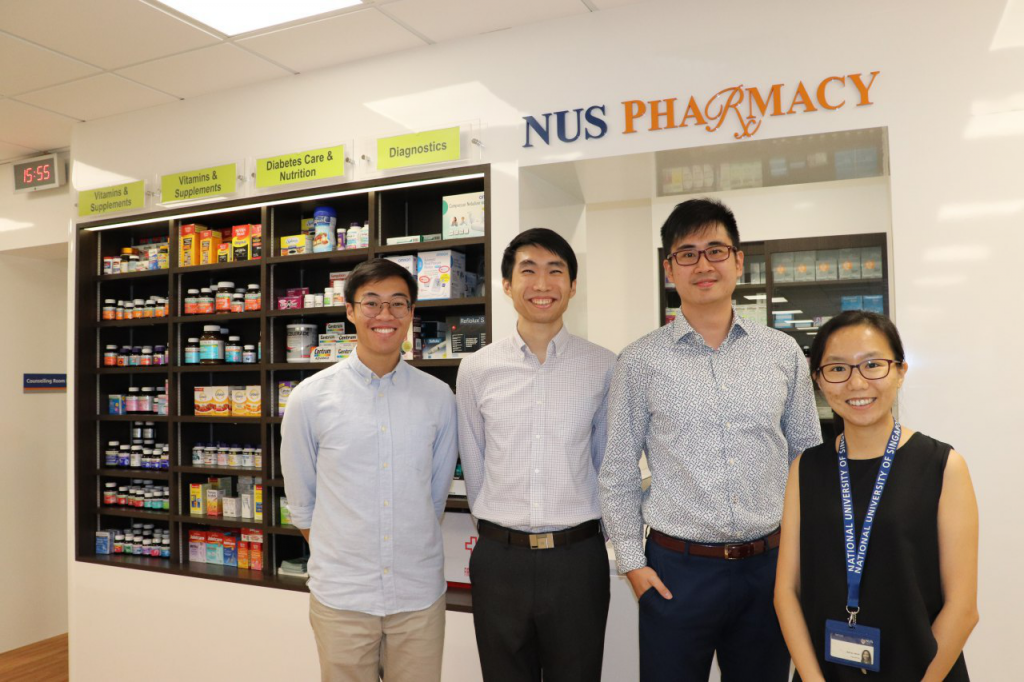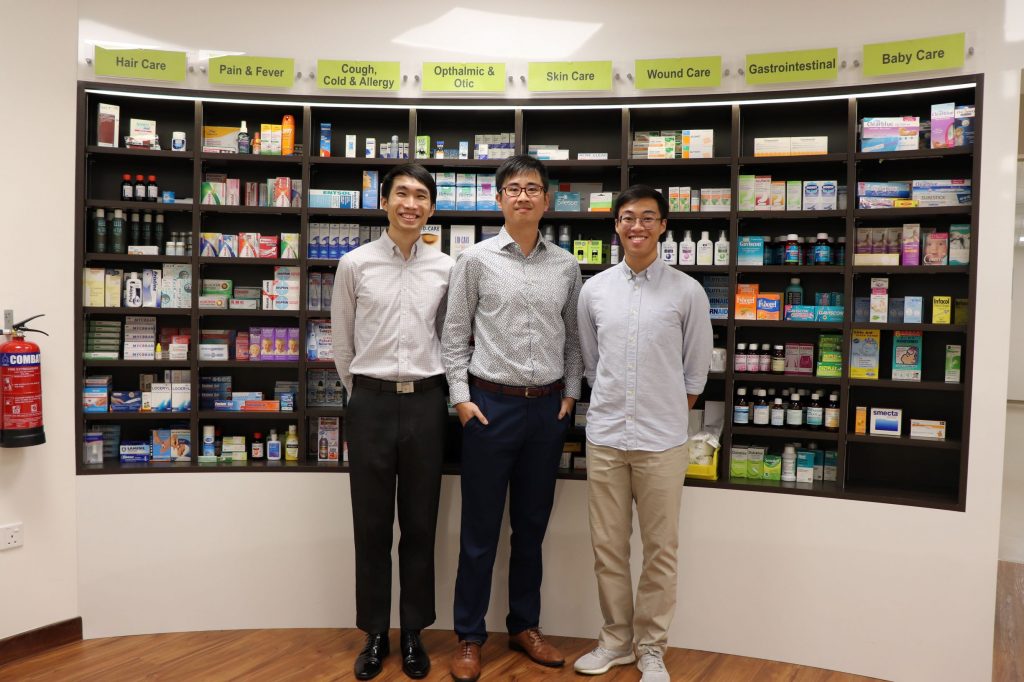Be part of something bigger than yourself
By Eugene Toh and Joshua Lim (Class of ’21)
In this issue, Mr Kenneth Leung (Class of ’13) shared with us how his experiences as a pharmacist sparked an innovative project and shaped his aspirations for the profession.

Mr Kenneth Leung with lecturer Dr Chng Hui Ting and student writers Eugene and Joshua.
Could you share with us briefly about your background?
I graduated from NUS Pharmacy in 2013 and did my pre-registration training at Khoo Teck Puat Hospital (KTPH). Thereafter, I worked for 5 years as an inpatient pharmacist with a special interest in the areas of heart failure and anti-coagulation. More than a year back, I made a switch from being a pharmacist to a healthcare data analyst. I am also the founder and project lead for MediView.
What is MediView?
MediView is an online national drug image platform where one can access high quality images of a wide range of medications. It is currently used by healthcare professionals for various purposes, including facilitating communication with patients.
What sparked the idea of this project and motivated you to pursue and grow it?
During my time as a pharmacist, while I was doing medication reconciliation with different patients on separate occasions, I realised that many of them only knew the colour and shape of the medications they were taking but not the actual name of the medications. Thus, I had to go down to the pharmacy to obtain the actual physical product to show it to the patient for verification. This experience motivated me to think of a solution to this problem that many other pharmacists also face. Together with a few teammates, we built a prototype of MediView and showed it to several stakeholders. The idea was well-received, and we worked hard to further develop it – it is still very much a work-in-progress!
What keeps me going is that this is actually a very fun process, and it is particularly meaningful since this product is benefitting so many users. In a way, you are also your own boss to a certain degree! This is something which I like to call ‘intrapreneurship”. I am someone who likes to learn new things so I find joy in it along the way. I would also say that I am very lucky to have supportive teammates and superiors along with me.
Can you share with us some tips on creating innovations?
You need to have a problem that resonates with you, and is something you believe is worth solving. You don’t have to think ‘I want to save the world’ or that ‘everyone must benefit from this’. You can begin with something that can help yourself or even just a few of your friends.
We understand that you are currently back in NUS pursuing a MSc in Business Analytics. What made you decide to embark on postgraduate studies and how has it been so far?
Several years back, I wanted to develop a mobile app that could support MediView, and thus decided to start learning programming on my own. Although I did not manage to develop an app from scratch (because I figured it will be more prudent to outsource such app development to the true developers), the experience has actually opened up the world of programming to me. Along the way, I got intrigued by the realm of data science and its multitude of use cases of AI applications in solving many problems, especially in healthcare.
What I enjoy about programming is that although you may make many mistakes in the process, you will not be judged, and you will be objectively corrected by the system. There is also a huge supportive data community out there. Also, at the end of it all, when you execute your code and it runs smoothly, there is a gratifying feeling where you feel like an artist having just completed a masterpiece 
Although I had good domain knowledge of how the healthcare system works and what data means in healthcare, I knew I was still severely lacking in technical skills. To overcome this gap, I decided to enrol in this MSBA course to equip myself with the relevant expertise.
The way the Masters course is run is particularly refreshing because there is a lot of classroom interaction and I get to learn from and network with people of different countries and industries. These interactions have broadened my perspectives on many issues and exposed me to many new ideas and different possibilities.
How has NUS Pharmacy prepared you for what you are doing now and what advice would you give to your undergraduate juniors?
The broad curriculum is good as it covers content such as pharmacostatistics and research methodology which are still useful for me as I pursue my Masters course. What I liked about the curriculum were the preceptorship opportunities and Final Year Project (FYP) which provided interactions with the real-world setting. When you stay too long in didactic classes, you tend to lose sight of the purpose of what you are studying for. Therefore, the real-world exposure through different channels and opportunities pushes you to think on a more “macro” level.
I would advise juniors to understand your own learning styles so that you are able to manage different commitments better. I would also encourage you to participate in different student life activities to learn how to work with different people outside your faculty, solve problems and see more things. It would be quite a waste if your university education is only about your grades.
Where do you think our healthcare system is progressing towards and how can pharmacists play a role in this?
I feel that the Ministry of Health’s “3 Beyonds” encapsulates where our healthcare system is moving towards. “Beyond Hospital to Community” is particularly pertinent as the future of healthcare is in the patients’ homes and their surrounding community. We should not be cooped up within the four walls of institutions. Nurses, doctors and therapists are already forging ahead with programs in the community. Pharmacists need to adapt accordingly to bring our expertise to the community to solve meaningful problems such as medication adherence.
I understand that NUS Pharmaceutical Society has initiatives that encourage students to engage the community. I feel that this is a good way to start developing soft skills in terms of connecting with patients. It will better equip future pharmacists to adapt to the changing healthcare landscape, as the future is very much about what skills you can offer and deliver.
To end off this interview, could you share your life motto with us?
“Be part of something bigger than yourself.”
#PassionPridePurpose

Mr Kenneth Leung with student writers Joshua (left) and Eugene (right)
